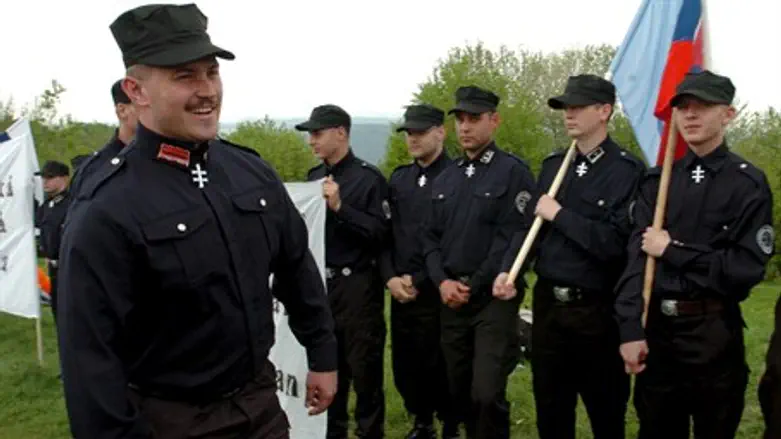
Two Slovak MPs on Wednesday donned yellow stars symbolizing the Holocaust in protest at the "dangerous" parliamentary debut of a far-right party they condemn as "fascist."
The opposition MPs wore the stars to an inaugural session of parliament following the country's March 5 election in which the Our Slovakia party won 14 seats. This is slightly under 10 percent of the total 150 seats in the legislature.
Ondrej Dostal, an MP with the liberal SaS, told journalists it was 83 years since the German Reichstag "approved the intention of Hitler's government to pass laws without Parliament" turning Germany into a Nazi dictatorship.
"It's significant that exactly 83 years after this act, Slovak fascists have marched into the Slovak parliament. It's dangerous and we want to highlight this," he said.
Viera Dubacova, from the conservative OLaNO-NOVA, also wore a yellow star.
Newly elected Our Slovakia MP Milan Uhrik denied his party was fascist and dubbed the protest "a circus, undignified for this place".
"What have we got to do with it? We do not consider ourselves to be fascists," he told the local TASR news agency.
Our Slovakia entered parliament for the first time following an election campaign in which major parties, including Prime Minister Robert Fico's winning leftist Smer-Social Democracy, took staunchly anti-Muslim and anti-refugee positions.
Our Slovakia leader Marian Kotleba, 38, is known for his hostility to both the Roma minority and the "establishment" and for leading street marches with party members dressed in neo-Nazi black uniforms. All parties ruled out cooperating with him.
Kotleba "is a neo-Nazi" who reaped the benefits of Fico's "nationalist rhetoric regarding migrants", analyst Samuel Abraham, head of the Bratislava International School of Liberal Arts, told AFP.
"His rising support does not surprise me. It has always been here."
Kotleba has also spoken warmly about former Slovak president Jozef Tiso, who agreed to deport tens of thousands of Jews to Nazi Germany during World War II.
Fico sealed a coalition deal with three right-wing and centrist parties last week, handing himself a third term and averting the risk of an early election ahead of Slovakia's EU presidency.
The ex-communist country of 5.4 million people is gearing up to take the rotating six-month helm of the EU from July -- a role that will put the health of its democracy in the international spotlight.
AFP contributed to this report.